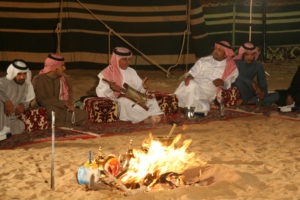Jordanian Hujeiny

It is one of the most famous forms of Jordanian singing, a color of ancient folk singing, which was echoed by travelers on the backs of their camels during their walking in the desert and its distant distances in various caravans. As the name implies these songs belong to the category of “camel songs” since the name is taken from the word “Hujin” and the singular is “Hujan” or “Hujein” which refers to “Baby camel “. Riding camels while travelling through the desert and singing on their backs was said to have great effects on camels and so camels can feel the ecstasy.
The singing relieves the road hardship and the trouble of travel, and urges the camels to walk fast. Camels extend their necks and follow the front legs and then tandem with the rear legs and walk as if it goes up and down, the singer feels this rise and fall and so his voice goes to harmonize with the walking of the camels in the desert.
Despite the fact that Al Hujeiny is linked to camels and Badia, it spreads widely in all parts of Jordan. It is characterized with a rich diversity of tunes and poems. It reflects also a diversity of moods and it has different popular types of poems.
Normally Al Hujeiny is performed by a single person playing the Rababa. However, it can be performed as interactive between two groups of people: They ask and reply each other through singing. These singers are called Murraddadeh. Al Hujeiny is sung in all occasions expressing different topics including flirting, satirical, pride and lamentation poems etc.

